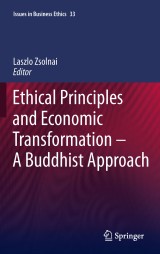Details

Ethical Principles and Economic Transformation - A Buddhist Approach
Issues in Business Ethics, Band 33
|
96,29 € |
|
| Verlag: | Springer |
| Format: | |
| Veröffentl.: | 17.05.2011 |
| ISBN/EAN: | 9789048193103 |
| Sprache: | englisch |
| Anzahl Seiten: | 216 |
Dieses eBook enthält ein Wasserzeichen.
Beschreibungen
<P>Buddhism points out that emphasizing individuality and promoting the greatest fulfillment of the desires of the individual conjointly lead to destruction. The book promotes the basic value-choices of Buddhism, namely happiness, peace and permanence. <P>Happiness research convincingly shows that not material wealth but the richness of personal relationships determines happiness. Not things, but people make people happy. Western economics tries to provide people with happiness by supplying enormous quantities of things and today’s dominating business models are based on and cultivates narrow self-centeredness.But what people need are caring relationships and generosity. Buddhist economics makes these values accessible by direct provision. Peace can be achieved in nonviolent ways. Wanting less can substantially contribute to this endeavor and make it happen more easily. Permanence, or ecological sustainability, requires a drastic cutback in the present level of consumption and production globally. This reduction should not be an inconvenient exercise of self-sacrifice. In the noble ethos of reducing suffering it can be a positive development path for humanity.</P>
<p>Preface.- Acknowledgement.-Introduction.- Why Buddhist Economics? Laszlo Zsolnai.- Part 1 Buddhist EthicsApplied to Economics.- The Relational Economy; Julie A. Nelson.- Buddhism andSustainable Consumption; Peter Daniels.- Economic Sufficiency and Santi Asoke; Julia Essen.- Pathways to aMindful Economy; Joel C. Magnuson.- Part 2 Achieving Happiness and Peace.- DoOur Economic Choices Make Us Happy? Colin Ash.- Gross National Happiness; SanderTideman.- The Application of Buddhist Theory andPractice in Modern Organizations; Bronwen Rees and Tamas Agocs.- Leadershipthe Buddhist Way; Laurens van den Muyzenberg.- Conclusion.- The Contributionsof Buddhist Economics; Laszlo Zsolnai. Bibliography of Buddhist Economics.- About the Authors.- Index.</p><p> </p>
<p>Buddhism points out that emphasizing individuality and promoting the greatest fulfillment of the desires of the individual conjointly lead to destruction. The book promotes the basic value-choices of Buddhism, namely happiness, peace and permanence.</p><p>Happiness research convincingly shows that not material wealth but the richness of personal relationships determines happiness. Not things, but people make people happy. Western economics tries to provide people with happiness by supplying enormous quantities of things and today’s dominating business models are based on and cultivates narrow self-centeredness.But what people need are caring relationships and generosity. Buddhist economics makes these values accessible by direct provision. Peace can be achieved in nonviolent ways. Wanting less can substantially contribute to this endeavor and make it happen more easily. Permanence, or ecological sustainability, requires a drastic cutback in the present level of consumption and production globally. This reduction should not be an inconvenient exercise of self-sacrifice. In the noble ethos of reducing suffering it can be a positive development path for humanity.</p>
The most comprehensive presentation yet of the Buddhist approach to economics and business Cutting edge research in CSR shows the relevance of Buddhism's promotion of cooperation, care and generosity Highlights one of the most popular and fast-growing trends in the USA, Western Europe and Japan

















